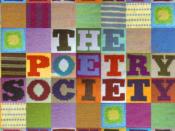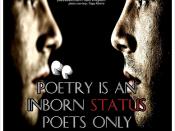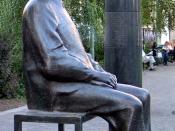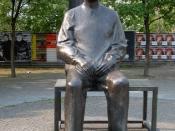Commentary of 700 Intellektuelle beten einen ÃÂltank anThe poem 700 Intellektuelle... was written by Bertolt Brecht in late 1927; an era in which industrialisation was looming after a period of economic depression. This poem was initially published in the literary periodical called Prisma in Zenith in early 1928 and then in a magazine by the name of Simplicissimus in early 1929. It featured as part of a collection of poems by Brecht in the Versuche series and was placed under the heading Aus dem Lesebuch für Städtebewohner. This contextual information regarding the poem can help provide additional meaning to the poem as well as also analyzing the text itself. I now plan to see how the text helps create meaning for the reader and also how other contextual information can also provide additional information to help understand the poem in more depth.
First of all, the form of this poem is quite striking.
The poem consists of 9 stanzas, in which there 49 verses unequally distributed. Of these 49 verses, there are 26 sentences and 28 clauses. This irregular sentence distribution may have been used for effect by Brecht for emphasis as seen with the one word on line 12; ÃÂltank. Brecht does not seem to use regular rhythm patterns but, on the contrary, uses breaks in rhythm for emphasis of shorter verses as seen on line 43. Also inconsistent is the sentence structure with sentence lengths varying from one word to thirty-four words and ÃÂenjambmentÃÂ is also a salient feature, possibly to imply some sort of irregularity about the ÃÂltank.
There are quite a number of stylistic features used by Brecht in this poem to create meaning. The use of a paradox on line 24 referring to the ÃÂltank as HäÃÂlicher and Schönste in succession could imply an air of confusion or perhaps of apprehension of the Intellektuellen. Another technique employed by Brecht is that of alliteration, which is first seen on line 5. The effect of the ÃÂvàsound is quite interesting as it could be considered as onomatopoeic and similar to the howling of the wind. Another example of alliteration is on line 33 and in this case, we see the vowel alliteration of the phoneme, which creates a more flowing sound, further increasing the effect of enjambment employed by Brecht. In addition to alliteration, the poem seems to resemble aspects of a prayer. This is shown by the direct address of the poem; it is clear that the poem is directed at somebody with its frequent uses of ÃÂDuÃÂ, ÃÂdichàand of the imperative form too, as is seen on line 26 ÃÂTueàand line 28 with ÃÂLöscheÃÂ. Also, the choice of vocabulary on line 30, ÃÂwie du willstàand line 55, ÃÂdarum ehöre unsàdem ÃÂbel des Geistesàseem similar to those found in a prayer and add to the feeling that the 700 Intellektuelle in the poem maybe feel that the ÃÂltank represents and is a sign for a new belief and thus speak in such a manner as to worship it. It can be argued that the ÃÂltank, described in juxtaposition with nature and the products of it, ein Gras, Elfenbein, Ebenholzàin order to create contrast, is symbolic of industrialisation, especially with the fact that the ÃÂltank is made out of Eisen; a material used in huge quantities in industry. In the last line of the poem, it appears that Brecht deliberately misspells a word to create the word Fordschritt, which can be seen as a direct reference towards the motor company Ford and surely as an attempt by Brecht to single out the company as spearheading industrialisation. It is apparent that the Intellektuellen do not seem to be phased by the overnight arrival of an ÃÂltank as there is only one question in the whole poem addressed to what seems to be a symbol of a new belief, which could imply an air of predictability surrounding industrialisation in the sense of calculation and Statistik.
The poem seems to raise issues combining industry and faith. Firstly, industry is implied on frequent occasions in the poem, especially with the lexical field of industry, Eisen, Elektrifizierung, Statistikà.The fact that the Intellektuellen ask to be saved from the evil of the mind in the name of Elektrifizierung, etc shows that they are putting their faith in, in this case, electrification; the main power source behind industry. This image of industrialisation is further stressed when placed in contrast to images of the old way of life, such as the windmills, die langsam mahlen, which is actually a biblical reference to the expression, Gottes Mühlen mahlen langsam and in turn, implies to the reader the notion of faith. Also in line with the theme of faith, there is the phrase, Herrlich! Herrlich! Herrlich! on line 36, which is a phrase heard in church and also refers to the fact that the ÃÂltank is made out of Eisen further strengthening the idea of a faith in industrialisation. It is apparent that Brecht would like to convey that this new faith in industrialisation has brought about a replacement of God for science and calculation, the references of which are frequent with the lexical field of calculation, Berechnung, nicht unendlich, Unscheinbarer.
Moving on to the context of the poem, it can be claimed that BrechtÃÂs relocation to Berlin in 1924 may have given him an idea of the industrial activity that was happening in Berlin and thus could have encouraged him to write this poem. Around the year of 1926, Brecht allegedly started to compose his own idea of Epic Theatre which was first seen in his Anmerkungen zur Oper ÃÂAufstieg und Fall der Stadt MahagonnyÃÂ in 1930 and, although the principles of Epic Theatre may have just been exclusive to theatre, could have transpired this notion into the poem with his use of language, which could be an explanation to why there is little personification of the ÃÂltank even though it is conveyed as some sort of ÃÂGodÃÂ. In terms of literary context, the poem was written in the era of Neue Sachlichkeit; a movement which came about as a reaction to Expressionism, which aimed to expose reality according to the writer in more sober terms which may explain the lack of a rhyme in this poem and also only 8 adjectives and adjectival nouns in the whole passage.
In conclusion, Brecht created meaning in this poem with his use of irregular sentence structure teamed with ÃÂenjambmentÃÂ in order to create emphasis on certain words. Stylistically, alliteration is used as device to create a flowing sound and as onomatopoeia. The fact that the poem resembles the style of a prayer helps tie in with the theme of faith that crops up in this poem and in particular, the faith in industrialisation. In terms of contextual influence, BrechtÃÂs location in Berlin may have been the most influential factor. Also notable are the development of his notion of Epic Theatre and the literary backdrop of Neue Sachlichkeit.
BibliographyRitchie, J.M, Periods in German Literature (London: Oswald Wolff, 1968)





